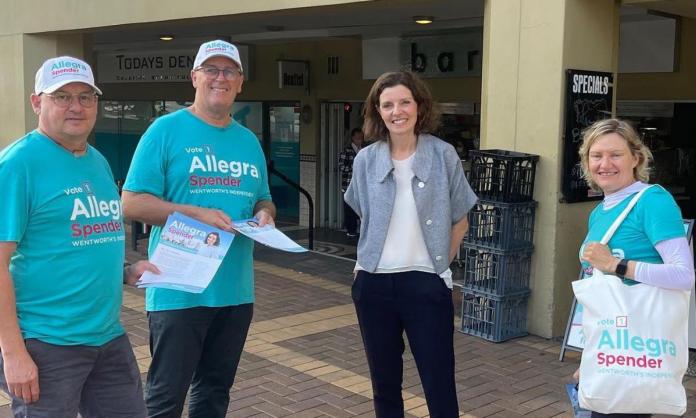The press headlines certainly give the idea that something serious is happening: “Is Australian politics about to have its Independents Day in the 2022 federal election?” (Canberra Times), “Meet the independent women who could change Australia” (Marie Claire) and “The independent insurgency threatening the Liberals” (Saturday Paper).
Is the current interest in independents unprecedented? The independent and minor party vote has been rising since 2007. But polling at the moment is not substantially different from what it was before the 2016 election, the previous high point. The share among minor parties has shifted towards the United Australia Party and One Nation, while the total for “others” has gone up from 7 to 10 percent. It remains the case that more than 70 percent of voters give their first preference vote to the ALP or the Coalition.
With so little difference between what’s on offer from Liberal and Labor, it’s not surprising that independents can seem like a progressive alternative. This is reinforced by the common-sense illusion that voting is the only way to change things.
But there is nothing progressive about the independents. This election, the media have particularly focused on the “Voices of” campaigns, such as “Voices of Wentworth” that is backing Allegra Spender in Australia’s wealthiest electorate.
Their model is Zali Steggall, who ousted former Prime Minister Tony Abbott from the blue-ribbon Liberal seat of Warringah in Sydney’s northern beaches (Australia’s second wealthiest electorate) at the last election. Some of them have even adopted her teal-coloured branding.
The issues that they all agree on are climate change, corruption and lack of accountability, and the treatment of women. But there is nothing left-wing about their approach to these issues.
Nor would you expect there to be. They are “lapsed Liberals” hoping to win votes from the wealthiest people in the land. Far from being a movement of “outsiders”, the independents have wealthy backgrounds themselves, at the very least being able to take months off from their positions as doctors or business people to represent other Liberal voters who find the current Coalition leaders too backward.
Some of them have impeccable ruling-class credentials. Allegra Spender’s background could hardly be more establishment. Her grandfather, Sir Percy Spender, was a cabinet minister in the Menzies government. Her father, John Spender, QC, was the Liberal member for North Sydney. Her mother was the fashion designer and businesswoman Carla Zampatti. Spender went to the elite Ascham School, then to Cambridge University to do an economics degree, later working at McKinsey as a business analyst, and eventually becoming managing director of the family fashion company.
Kate Chaney can give Spender a run for her money in the blue blood stakes. She is standing as an independent for the seat of Curtin in Perth (the ninth wealthiest electorate in Australia). Her uncle, Fred Chaney, was a minister in the Fraser government and deputy Liberal leader for a period. She has had a business career that includes being a corporate lawyer, then business consultant, and a stint at Wesfarmers.
The list could go on, but the common features are clear. These are right-wing candidates (what Allegra Spender calls “economically responsible and socially progressive”) appealing to other People Like Us in wealthy Liberal electorates—the sort of seats where any candidate proposing increased taxes on the rich or wage rises for public sector workers would not get elected. That would not be “economically responsible”.
But freed of the dull concerns about the cost of living that plague working-class people, being “socially progressive” on some issues comes at little cost.
This is clear when you examine what their climate concerns amount to. No nonsense about the drive for profit being the source of environmental destruction. For these right-wingers, profits are the answer to environmental destruction. Spender says of her position on climate change: “It’s not a radical thing at all and it’s also an economic opportunity ... Australia is one of the sunniest and windiest places on earth and we have all the rare earth metals, we have lithium, we are incredibly well placed for this transition and to actually be an exporter, a superpower”.
Their concerns about the treatment of women raise similar class issues. Changing the gender balance in parliament by electing these moderates will do nothing for most women. Their campaigns are couched in terms of “all women”, but they are much more concerned about what happens to the “women who matter”, such as the women company directors—including former Australia Post CEO Christine Holgate, Unisuper director Nicolette Rubinsztein and chair of the Clean Energy Finance Corporation Jillian Broadbent—who are backing Spender’s campaign.
Interviewed before the 2019 election, Zali Steggall said that she was “dismayed” that the Liberal Party overlooked its long-standing deputy leader, Julie Bishop, as Turnbull’s replacement. That was hardly a blow to women’s liberation.
There are plenty of reasons to be dissatisfied with the anti-working-class policies of Liberal and Labor, and with the largely contentless election campaign. Many people would like to see a political force in parliament capable of standing in opposition to the right-wing consensus that currently exists.
That is not what these Liberals in teal clothing are offering. They won’t even say who they would support in the event of a hung parliament. While Greens leader Adam Bandt has now ruled out backing the Liberals in a balance of power situation, none of these independents has said they won’t keep the Coalition in office.
On the contrary, Zali Steggall’s website proclaims that she has voted with the government more than 50 percent of the time. Allegra Spender’s supporters would have previously identified as Liberal moderates. “Countless people”, she says, had told her this, “and said either the last election or the coming election is the first time they’ve ever considered not voting Liberal”.
Workers don't need “economically responsible” independent MPs. We need our own party that will take on the defenders of the profit system.









